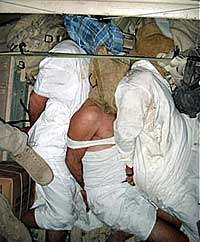The bad apples are at the top
Bush established torture regime under theory of absolute power

Boot kicking detainees in distress positions happens under the color of high-level authority.
A report by Michael Isikoff, Daniel Klaidman and Michael Hirsh of Newsweek in the Dec. 27 / Jan. 3 issue underscores the very clear reasons why torture of detainees under US care is not just the work of a few bad-apple, low-level grunts. They write about meetings held in the office of now Attorney-General nominee Alberto Gonzales during July 2002:
And partly out of the discussions in Gonzales's office came the most notorious legal document to emerge from last spring's Abu Ghraib interrogation scandal. This was an Aug. 1, 2002, memo -- drafted by [Justice Department lawyer John] Yoo, signed by Assistant Attorney General Jay Bybee and addressed to Gonzales -- which provoked outrage among human-rights advocates by narrowly defining torture. The memo concluded, among other things, that only severe pain or permanent damage that was "specifically intended" constituted torture. Mere "cruel, inhuman or degrading" treatment did not qualify.So the usual definition of torture was set aside by those at the top, and if a technique was not intended to be torture under these self-defined criteria, it simply no longer would be called such.
Furthermore, Bush was the direct recipient of ethically-questionable legal gymnastics intended to neutralize US law and the Geneva Conventions:
...memos reviewed by Newsweek and interviews with key principals show that Gonzales's advice to the president reflected the bold views laid out in the Aug. 1 memo and other documents. Sources close to the Senate Judiciary Committee say a chief focus of the hearings will be Gonzales's role in the so-called "torture memo," as well as his legal judgment in urging Bush to sidestep the Geneva Conventions. In a Jan. 25, 2002, memo to Bush, Gonzales said the new war on terror "renders obsolete Geneva's strict limitations on questioning of enemy prisoners." Some State Department lawyers charge that Gonzales misrepresented so many legal considerations and facts (including hard conclusions by State's Southeast Asia bureau about the nature of the Taliban) that one lawyer considers the memo to be "an ethical breach." In response, a senior White House official says Gonzales's memo was only a "draft" and just one part of an extensive decision-making process in which all views were aired.In an accompanying article, Isikoff describes the royal theory of absolute presidential power in matters of torture, and indeed the entire legal backing for invading Iraq that Bush and his shady lawyers declared for themselves:
Just two weeks after the September 11 attacks, a secret memo to White House counsel Alberto Gonzales' office concluded that President Bush had the power to deploy military force "preemptively" against any terrorist groups or countries that supported them -- regardless of whether they had any connection to the attacks on the World Trade Towers or the Pentagon.Aggression is the supreme crime under international law. The record under the Bush regime is an open declaration that these precepts no longer apply to the US post-911. If this declaration sticks, the post-WWII international order is dead and a new era of international Aggression is upon us.
The memo, written by Justice Department lawyer John Yoo, argues that there are effectively "no limits" on the president's authority to wage war -- a sweeping assertion of executive power that some constitutional scholars say goes considerably beyond any that had previously been articulated by the department....
What is particularly striking is that it goes beyond the joint congressional resolution passed on Sept. 14, 2001, authorizing the president to respond to the terror attacks. Although the White House had initially sought authority for the president to "preempt any future acts of terrorism" without any limitation on those responsible for the attacks on the Pentagon and World Trade Center, Congress deleted the pre-emption request and narrowed the scope of the president's authority to attack only those connected with September 11. "The authority granted is focused on those responsible for the attacks of Sept. 11," Sen. Joe Biden stated on the Senate floor in explaining what Congress intended to authorize.
But Yoo's memo, written 11 days later, essentially argued that what Congress authorized didn't matter. "It should be noted here that the Joint Resolution is somewhat narrower than the President's constitutional authority," Yoo wrote in the memo, adding that the resolution "does not reach other terrorist individuals, groups or states which cannot be determined to have links to the September 11 attacks."
"Nonetheless," he added, "the President's broad constitutional power to use military force to defend the nation, recognized by the Joint Resolution itself, would allow the President to whatever actions he deems appropriate to pre-empt or respond to terrorist threats from new quarters." The memo was written at a time when, unknown to the public, officials in the Pentagon -- including Secretary of Defense Donald Rumsfeld and Deputy Secretary Paul Wolfowitz -- were privately pushing the president to consider attacking Iraq. Indeed, according to the September 11 commission, a memo apparently written by Under Secretary of Defense Douglas Feith just five days before Yoo's memo suggested "hitting terrorists outside the Middle East in the initial offensive, perhaps deliberately selecting a non-al Qaeda target like Iraq."
